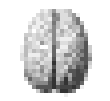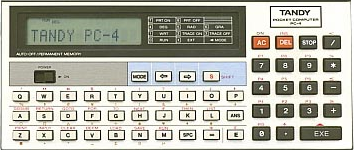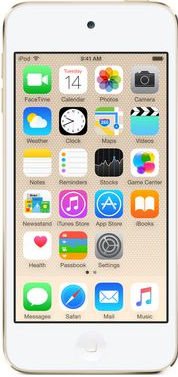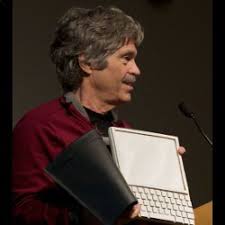Contents
Augmenting brains
Why Fleabyte?
Fleabyte fundamentals
Orality, Literacy, Computency
Unfinished Revolution
From elsewhere
Fleabyte fundamentals:
What you've got underneath may not take you to the top
A Flea in the Bonnet

Fleabyte: Augmenting the human brainA personal journey
Fleabyte has been my term for any pocket computer for at least three decades. My first acquantance with Fleabyte was the Radio Shack PC-4 (soon renamed to Tandy PC-4) with its 12-character LCD display. The programming language was a simple version of BASIC (All-purpose Symbolic Instruction Code). Manufacture began in 1982, but I don't recall when I acquired it. Without any knowledge of the intracacies of computer science, it became immediately evident that this device and its further develoments ought become a way toward augmenting the human brain and, hence, become an asset to education and work; indeed for everyday life. 180810-1 
Radio Shack/Tandy PC-4. Dimensions: 16.5 x 7.1 x 1.0 (cm; weight: 110 g. It had a port for a printer using a 4.x-cm-wide rice-paper tape as well as for a tape casette and sold for about $100 (Cdn). See source for further details). 180810-2 As a chemistry teacher I immediately had a good use for it. I programmed it for checking sudents' laboratory reports. I would enter their experimentally obtained data to check their calculations, printed those out to obtain the -wide paper strips with the program's calculated data, and, instead of making handwritten corrections, pasted those strips in the margins of their lab reports so that students could see if and where calculating errors occur. 180810-3 Next I prepared offer a course about pocket computers for college teachers and prepared a text for it, The very first original Fleabyte course. The course included simple BASIC programming and for getting the feel of things about 75 demo programs, all taking up less than 1.5 kilobytes. But far more importantly, the cousrse's emphasis was on the pocket computer's potential as an intimate companion: people becoming beings of two minds: a neural mind augmented by a digital mind. Here is how I introduced the course (in 1988): 180816-1
The course was well received, but lasted for only two or three years because the kind of cheap programmable computers used—notably from Casio*—went off the market which was not sufficiently favorable. Pocket computers, as we knew them then, featured liquid-crystal displays (LCDS) capable of accomodating only one or two lines of text ranging from 12 to 24 or so characters. The programming language was usually BASIC. Computer literacy in those days was for all practical purposes synonymous with the ability to program in BASIC. But things began to change drastically around 1889. 180816-7 There is a chapter in my course text that looks to me still very much relevant today: Orality, Literacy, and Computency. 180816-8
I found it hard to keep up with all the rapid developments going on while also being a full-time college teacher. Trying to promote pocket computers to be optimized for truly personal augmentation puts me in a highly sophisticated world of professionals and specialized organizations such as Xerox, Microsoft, Apple, etc, etc.. For that reason I applied for a grant to allow me a year full-time to try to follow through with my notion of on-the-person computing or personal augmentation. It was rejected. Maybe that in the opinion of the grants committee I was overly audacious, overreaching myself. Looking back, probably likely so. But it was the way I was heard to explain my case that upset me. More on that in two of my Letters to my Dawson Colleages: here and in the next letter. 180816-9 
Apple iPod (16, 32 and 64 GB). Dimensions: 12.3 x 5.9 x 0.6(cm; weight: 88 g. Wi-Fi, camera, audio, etc. and sold for about $175 (Cdn). For further details go here and look for Tech specs. 180816-10 Now, three decades later, the name Fleabyte includes Apple's iPod (which is no longer manufactured), the ubiquitus iPhone and competing devices that have taken the market by storm. Mine is the 16GB version of an iPod and there are apps that let one make programs in Python. Like BASIC, Python is available in an interpreted version. I haven't made programs in donkey's ages, but maybe I can still, at my age, revive some simple programming skills. We shall see, what we shall see. 180816-11 * * *
With programmable pocket computers off the market, I turned to an Atari ST and got familiar with a superior kind of BASIC, GFA BASIC. I used it for making some rudimentary on-screen scientific calculators with built-in physical constants and atomic weights and adaptations for doing some simple chemical calculations as found in a college general chemistry course. This made me wonder about what we really should be teaching in such a course. 180829-1 And another thing. I could transfer an entire equation or just the answer to an editor by a simple click. In other words, I joined two apps, but actually without understanding just what in the Atari's operating system (TOS) made this possible. Reminiscent of a term in quantum physics, I named it a wormhole But, more importantly, if one can make two apps intimately working together, well, why not three or more? I still had a lot to learn, still do! 180829-2 The screens of the Atari monitors were quite small, but it soon became possible to build computers from components and thereby getting away from proprietary machines and operating systems along with the ability to have larger display areas to work with. What then botered me were the long lines of black text and their harsh contrast with backlit white backgrounds. Those needed to be softened which led me to shorten those long lines of text, to give them a dark brown color on a parchment background—as we have here. Margins became available for things like a display of a document's content or some comment. Those secondary texts were put in smaller print as were some comments in the main text. Character size and a slightly brighter brown serve as something akin to intonation in speech. 180829-3 Many people prefer to read from paper than from screens. This led me to wonder about language as printed, language with an extensive use of synonyms with many syllables. Shouldn't we, for the screen at least, try to use a simpkler way of expressing ourselves? I have looked at old English, at Latin, even at proto-Indo-European, and all I can say is that it's a complicated subject. But still .... 180829-4 Things simply became overwhelming for a person just trying to think things through by himself in a world from many sides is screaming for attention. Among them unpleasant experiences at my place of work, Dawson College. More about that in Letters to my Dawson colleagues written in 1990. 180829-5 * * *
Twenty years had gone by when I learned about a symposium named The Unfinished Revolution held in the winter of 2000. What made me join it as an on-line participant, I just don't remember, but it turned out to be, what do I say, quite an experience, in the course of which I was asked to serve as volunteer webmaster for an organization led by computer pioneer Douglas Engelbart. From retirement life far from the madden crowd, it brought me in touch with intellectuals and experts and going-ons in Silican Valley, plus the good fortune of being invited to come over as a guest of Doug himself a number of times. There I met inventors like Ted Nelson, professors at Stanford University, and somewhat lesser lights, but still, whose intellectual stations were way above mine. 180829-6 On my first visit, I was asked to make a brief presentation for a dozen or so people from Doug's circle. I projected a brief text loaded with musical terms most people are not familiar with, but I had copied from a booklet enclosed with recordings of the violinist Accardo playing Paganini. I asked my audience to silently read it and then suggested that their own general audiences would have similar difficulties understanding them. 180829-7 And not only that, keeping things simple goes a longer way for it permits people to get a grasp of many more things that affect human society— to become "all-terrain vehicles" as I had pointed out in my twelfth letter to my Dawson colleagues, here. 180829-8 As for my stint as Doug's webmaster, some people felt they could improve on my work by using more of the tricks html has on offer, but I didn't go for that. There is more to making and maintaining a website that knowing how to exploit html, some of which I mentioned above. 180829-9 Doug's thinking was often hard to follow, but at age 75 he had learned to live with it—without ever giving up on trying to promote his vision of how the advent of the computer is an opportunity to augment the human intellect and thereby serve his stated lifetime goal: "As much as possible, to boost mankind's collective capability for coping with complex, urgent problems." It was in the pursuit of this goal that his research efforts let to to such now ordinary things as the computer mouse, the computer's graphical user interface, hyperlinking, email, and some other contributions. More about this in my brief overview Unfinished Revolution. But something needs emphasis right here. 180829-9 All his highly sophisticated thinking and work notwithstanding, Doug's primary concern was humanitarian, not technical. As such he became strongly opposed to soulless artificial intelligence for entirely replacing the human brain. He perceived computers as a device to help—augment—the human brain. Big difference. 180829-10 Ideas and ideals have changed much during recorded history and with them the educational objectives we set for our young. I don't recall my source, but here is how somebody lined up the sort of contributions some thinkers made to society, to which I added an option: 180829-11
Engelbart's site (that of his Bootstrap Institute) was eventually replaced by that of The Engelbart Institute run by his daughter Christina. 180829-13* * * My website has for the last dozen of years or so been devoted to the history of my wife's patrilinear ancestry. Part of it, named My 2 cents, was intentionally left blank until I might have something of value to contribute on-line. That came about in 2014 when I began an "on-going" essay about the Canadian Senate which, I think, ought to be made of much greater value to Canadians in these times of ever accellerating global change and worldwide calamities. And with that, I'll point to the menu bars at the top of this page. 180829-11
Footnotes Walter J. Ong, Orality and Literacy, Methuen, 1982. * fn1 Casio, for some time much engaged in designing and manufacturing pocket computers, came up with many models as shown here. * fn1 |
--
| top of page |
|

